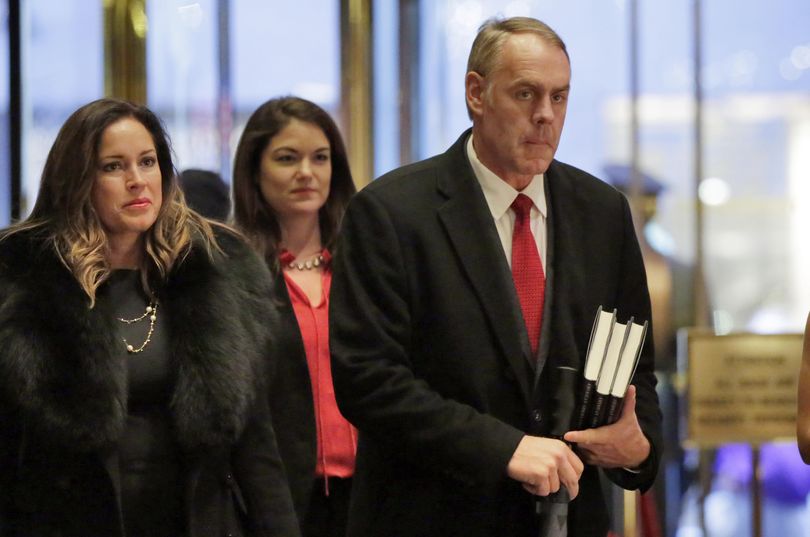Zinke favors increasing ‘uses,’ boosting production of federal lands

PUBLIC LANDS -- Donald Trump's nominee for Interior secretary is laying out his ideas for future uses and potential abuses of federal public lands. Let's make sure that wildlife habitat, clean air and water and open space for public access remain high on the agenda.
Here's today's latest from the Associated Press.
WASHINGTON – President-elect Donald Trump’s choice for interior secretary says the nation’s vast federal lands should be used for a variety of purposes, from hiking, hunting, fishing and camping to harvesting timber and mining for coal and other energy sources.
In prepared remarks for his confirmation hearing on Tuesday, Montana Rep. Ryan Zinke said his father and the Boys Scouts taught him the principles of environmental stewardship and the importance of public access to public lands.
Zinke, an admirer of President Theodore Roosevelt, said management of federal lands should be done under a “multiple-use” model set forth by Gifford Pinchot, a longtime Roosevelt associate and the first chief of the U.S. Forest Service.
Zinke also pledged to tackle an estimated $12 billion backlog in maintenance and repair at national parks, saying parks and other public lands should be a key part of Trump’s infrastructure improvement plan.
The Associated Press obtained a copy of Zinke’s remarks in advance of the hearing before the Senate Energy and Natural Resources Committee.
Zinke has said he would never sell, give away or transfer public lands – a crucial stance in his home state of Montana and the West where access to hunting and fishing is considered sacrosanct.
Zinke feels so strongly that he resigned as a delegate to the Republican National Convention last summer because of the GOP’s position in favor of land transfers to state or private groups. But Zinke’s commitment to public lands has come into question in recent weeks and is likely to be a point of contention at Tuesday’s hearing.
Zinke, 55, a former Navy SEAL who just won his second term in Congress, was an early Trump supporter and, like his prospective boss, has expressed skepticism about the urgency of climate change.
As a self-described “Teddy Roosevelt Republican,” Zinke has supported legislation to boost land and water conservation and recreation on public lands. Zinke has also advocated for increased oil and gas drilling and coal-mining on Western lands.
The Interior Department and other U.S. agencies control almost a third of land in the West and even more of the underground “mineral estate” that holds vast amounts of coal, oil and natural gas.
Zinke’s position on public lands came under fire after he voted in favor of a measure from House Republicans that would allow federal land transfers to be considered cost-free and budget-neutral, making it easier for drilling and development.
Zinke “says he’s against transfer of federal lands, but there’s a big gap between what he says and what he does in that regard,” said Michael Brune, executive director of the Sierra Club, the nation’s oldest and largest environmental group.
Zinke’s spokeswoman said the congressman maintains his position against the sale or transfer of federal lands.
Indeed, his support for public lands was a crucial reason why Zinke was chosen by Trump. The president-elect and his son, Donald Trump Jr., both oppose sale of federal lands. The younger Trump, an avid hunter, has taken a keen interest in Interior issues and played a key role in Zinke’s selection.
Coal is likely to be another focus on Tuesday. Montana boasts the largest coal reserves in the nation, and Zinke has warned environmentalists and the Obama administration that to take coal out of the energy mix would be “a disaster.”
“I don’t agree with keeping it in the ground,” he said during his re-election campaign.
The Theodore Roosevelt Conservation Partnership endorsed Zinke, calling him “a leader on many issues important to America’s hunters and anglers.”
Brune, of the Sierra Club, scoffed at the comparison to Roosevelt, saying the only way to connect the men is “to describe the ways Zinke wants to undo TR’s legacy” of conservation.
Sen. Maria Cantwell of Washington state, the top Democrat on the energy panel, said she is eager to ask Zinke about modernizing the federal coal program “to make sure American taxpayers aren’t short-changed for the benefit of corporate interests.” Cantwell also said she wants reassurances that Zinke will protect the interests of American consumers and native tribes, and “not just the coal and mining companies.”
Zinke spent 23 years as a Navy SEAL and was awarded two Bronze Stars for combat missions in Iraq. He currently serves on the House Natural Resources and Armed Services committees.
He made an unsuccessful 2012 run for Montana lieutenant governor before shifting his ambitions to Congress in 2014. Before his selection for Interior, Zinke had been considered a likely challenger to Democratic Sen. Jon Tester in 2018.
Here's another report focused on quesitons Zinke answered on climate change:
